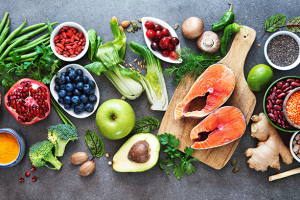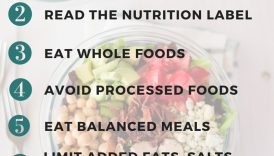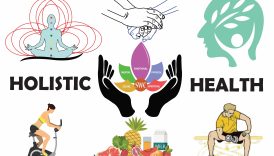Eating Your Way to a Healthier Life: The Power of Nutrient-Dense Foods

Importance of Nutrient-Dense Foods
In today’s fast-paced lifestyle, the importance of nutrient-dense foods cannot be overstated. These foods, which are rich in vitamins, minerals, and other essential nutrients relative to their calorie count, play a vital role in enhancing one’s overall health and vitality. Choosing nutrient-dense options — such as fruits, vegetables, whole grains, lean proteins, and healthy fats — can lead to better physical and mental well-being. When one starts incorporating more nutrient-dense foods into their diet, they often notice a profound change. For instance, someone might swap out sugary snacks for a handful of almonds and experience increased energy levels and improved concentration throughout the day. It’s remarkable how these small changes can make a big difference.
- Eating Your Way to a Healthier Life: The Power of Nutrient-Dense Foods
- Importance of Nutrient-Dense Foods
- Benefits of Eating Healthier
- Understanding Nutrient-Dense Foods
- Definition and Characteristics
- Key Nutrients to Focus On
- The Impact of Nutrient-Dense Foods on Health
- Role in Disease Prevention
- Boosting Overall Well-being
- Incorporating Nutrient-Dense Foods into Your Diet
- Tips for Meal Planning
- Creative Recipe Ideas
- Tracking Your Progress
- Importance of Monitoring Nutrient Intake
- Tools and Apps to Help
- Overcoming Challenges
- Dealing with Cravings
- Strategies for Eating Out
- The Future of Nutrient-Dense Foods
- Trends in Healthy Eating
- Innovations in Food Industry
Benefits of Eating Healthier
Eating healthier not only aids in weight management but also contributes significantly to disease prevention and long-term health. Here are some benefits often experienced by those embracing a nutrient-dense diet:
- Improved Energy Levels: Foods packed with nutrients can provide sustained energy without the crashes associated with processed foods.
- Enhanced Mood: A balanced diet rich in vitamins can positively affect mental health, reducing feelings of anxiety and depression.
- Better Digestion: Whole foods are often high in fiber, which aids digestion and promotes gut health.
Ultimately, choosing nutrient-dense foods is a pathway to a healthier, more vibrant life.
Understanding Nutrient-Dense Foods
Definition and Characteristics
To truly embrace the power of food choices, it’s essential to understand what nutrient-dense foods are. Simply put, nutrient-dense foods contain a high amount of nutrients with relatively low calories. Unlike empty-calorie foods, which offer little in terms of nutritional value, nutrient-dense options nourish both the body and the mind. For example, consider a cup of spinach compared to a bag of chips. While the chips might satisfy a craving in the moment, spinach provides vitamins A, C, and K, fiber, and other essential minerals in a fraction of the calories. Characteristics of nutrient-dense foods often include:
- High in Vitamins and Minerals: Foods rich in essential nutrients.
- Low in Added Sugars and Unhealthy Fats: Minimal processed ingredients.
- Whole and Unprocessed: Items that retain their natural state.
Key Nutrients to Focus On
When aiming for a nutrient-rich diet, certain key nutrients should be prioritized:
- Fiber: Great for digestion and can be found in whole grains, fruits, and vegetables.
- Lean Proteins: Essential for muscle repair and can be sourced from chicken, fish, beans, and legumes.
- Healthy Fats: Important for brain health, found in avocados, nuts, and olive oil.
Focusing on these nutrients not only supports overall health but also fosters a sustainable way of eating.
The Impact of Nutrient-Dense Foods on Health
Role in Disease Prevention
When it comes to preventing diseases, nutrient-dense foods play an invaluable role. Research consistently shows that diets rich in whole, nutrient-dense options can lower the risk of chronic conditions such as heart disease, diabetes, and even certain cancers. For instance, a friend of mine switched from processed snacks to a variety of fruits and vegetables, and not only did she feel more energized, but her recent health check-ups showed improved cholesterol levels. Nutrient-dense foods typically contain antioxidants, phytochemicals, and other compounds beneficial for combating inflammation and oxidative stress. Here are a few examples of foods known for their preventive properties:
- Berries: Packed with antioxidants and vitamins, they help reduce the risk of heart disease.
- Leafy Greens: Full of vitamins and phytonutrients, they are linked to lower cancer rates.
- Whole Grains: Rich in fiber, they contribute to better digestive health and reduced obesity risk.
Boosting Overall Well-being
Beyond disease prevention, nutrient-dense foods significantly boost overall well-being. They provide sustained energy throughout the day, improve mood, and can even enhance cognitive function.
- Increased Energy: Instead of the quick energy spike from sugary foods, nutrient-dense options provide lasting vitality.
- Enhanced Mood: A diet high in omega-3 fatty acids—found in walnuts and fish—has been linked to decreased feelings of anxiety and depression.
- Weight Management: With high nutritional value but lower calorie counts, these foods are great allies for those looking to maintain or lose weight healthily.
In essence, integrating more nutrient-dense foods into daily meals is a powerful step toward a healthier, happier life.
Incorporating Nutrient-Dense Foods into Your Diet
Tips for Meal Planning
Transitioning to a diet rich in nutrient-dense foods can seem daunting, but with a bit of meal planning, it becomes much more manageable. One effective approach is to dedicate a few hours each week to prepare and organize meals. For instance, my friend started dedicating Sundays to batch-cooking wholesome meals, and it has significantly simplified her week. Here are some practical tips for successful meal planning:
- Create a Weekly Menu: Outline meals for the week, focusing on incorporating fruits, vegetables, whole grains, and lean proteins.
- Make a Grocery List: Stick to your list to avoid purchasing processed foods that don’t serve your goals.
- Prep Ingredients: Chop vegetables, wash fruits, and even pre-cook grains so they are ready to use during the week.
- Portion Meals: Use containers to divide meals for easy access and portion control.
Creative Recipe Ideas
Spicing up nutrient-dense meals can make healthy eating exciting! Here are a few creative recipe ideas to inspire you:
- Rainbow Buddha Bowl: Layer quinoa, roasted chickpeas, and a variety of fresh veggies, topped with a lemon-tahini dressing.
- Avocado Toast: Mash avocado on whole-grain bread and top with sliced tomatoes, radishes, and a sprinkle of seeds for added crunch.
- Smoothie Packs: Prepare freezer bags with frozen fruits, greens, and seeds. In the morning, just blend with your choice of liquid for a quick breakfast.
Incorporating these nutrient-rich foods doesn’t have to be mundane. With a little creativity and planning, eating healthy can be both enjoyable and fulfilling!
Tracking Your Progress
Importance of Monitoring Nutrient Intake
As you embark on your journey to incorporate more nutrient-dense foods into your diet, tracking your progress can be incredibly valuable. Monitoring nutrient intake not only helps ensure you’re meeting your health goals but also allows you to recognize patterns and make adjustments where necessary. For example, one of my colleagues started logging her meals and discovered she wasn’t getting enough fiber, which led her to add chia seeds and leafy greens to her diet. By observing the types of foods she consumed, she felt empowered to make choices that improved her overall well-being. Here are several reasons why tracking nutrient intake is essential:
- Identifying Deficiencies: Pinpointing any lack of vitamins or minerals in your diet can lead to better food choices.
- Maintaining Motivation: Seeing progress over time can keep you motivated to stay on track.
- Making Informed Adjustments: Understanding your eating habits allows you to modify them for more balanced nutrition.
Tools and Apps to Help
Today, there are numerous tools and apps designed specifically for tracking nutrient intake. Some popular options include:
- MyFitnessPal: A comprehensive food diary and exercise log that provides a detailed nutrient breakdown.
- Cronometer: Offers precise tracking and is especially useful for those who want to monitor micronutrients closely.
- Lose It!: Focuses on calorie counting while also tracking nutrients and macros.
Utilizing these tools can simplify tracking your progress, making it easier to maintain a healthy lifestyle and enjoy the benefits of nutrient-dense foods!
Overcoming Challenges
Dealing with Cravings
As anyone who has navigated a healthier diet can attest, cravings for less nutritious foods can occasionally derail even the most dedicated individuals. However, understanding how to manage these cravings is crucial for maintaining your commitment to a nutrient-dense lifestyle. For example, whenever I feel a sudden urge for sweets, I reach for a handful of frozen berries instead. Not only do they satisfy my sweet tooth, but they also provide essential vitamins and antioxidants! Here are some strategies to manage cravings effectively:
- Stay Hydrated: Sometimes thirst masquerades as hunger. Drinking a glass of water may help curb those cravings.
- Eat Balanced Meals: Incorporate proteins, healthy fats, and fiber into your meals to help stabilize blood sugar levels and keep you fuller for longer.
- Choose Healthier Alternatives: Satisfy cravings with nutritious substitutes. Try dark chocolate for a craving for sweets or air-popped popcorn for a salty snack.
Strategies for Eating Out
Dining out can pose its own set of challenges when trying to maintain a nutrient-dense diet. However, with a few strategic approaches, eating out can still be enjoyable and healthy.
- Research Menus in Advance: Many restaurants offer their menus online; finding nutrient-dense options ahead can help. Think grilled fish, salads with plenty of veggies, or whole-grain dishes.
- Don’t Be Afraid to Customize: Ask for substitutions, such as steamed vegetables instead of fries or a side salad instead of bread.
- Portion Control: Consider sharing a dish or packing half of your meal for later. Many restaurant portions are larger than needed.
By arming yourself with these strategies, you’ll be better equipped to navigate cravings and dining situations while still prioritizing your health goals!
The Future of Nutrient-Dense Foods
Trends in Healthy Eating
As society becomes increasingly health-conscious, the future of nutrient-dense foods is bright, with several trends shaping how we view and consume healthy options. One trend is the growing preference for plant-based diets. Many people are discovering that incorporating more fruits, vegetables, legumes, and whole grains can greatly enhance their health while also being kinder to the planet. During my own journey into plant-based eating, I found that experimenting with recipes not only widened my culinary horizons but also boosted my energy levels and mood. Some major trends in healthy eating to keep an eye on include:
- Functional Foods: Foods that offer health benefits beyond basic nutrition, such as probiotics in yogurt or turmeric’s anti-inflammatory properties.
- Local Sourcing: An increase in demand for locally grown products fosters community support and usually ensures fresher, more nutrient-rich options.
- Meal Delivery Services: With busy lifestyles, more people are turning to meal prep services that focus on healthy, nutrient-dense meals, making healthy eating more accessible.
Innovations in Food Industry
Innovations within the food industry are also paving the way for easier access to nutrient-dense foods. For example, advancements in agricultural technology are helping to produce nutrient-rich produce more efficiently.
- Vertical Farming: This innovative approach allows for year-round crop production in urban areas, minimizing transportation time and enhancing freshness.
- Food Fortification: Companies are increasingly fortifying everyday foods with vitamins and minerals, making it easier for consumers to meet their nutrient needs without additional effort.
- Plant-Based Alternatives: The rise in innovative plant-based products — like dairy-free cheeses and meat alternatives — is making it simpler for individuals to shift to healthier diets without sacrificing taste.
Together, these trends and innovations indicate a promising future for nutrient-dense foods, ensuring that healthy eating remains a priority for individuals and communities alike.




